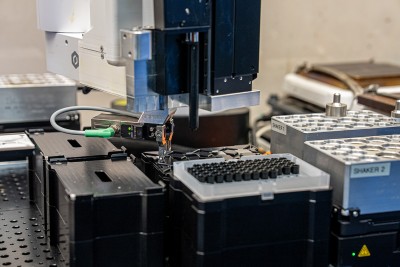Science
Berkeley Lab Unveils Automated Platform for Material Optimization

A research team at the Lawrence Berkeley National Laboratory has developed and successfully demonstrated an innovative automated experimentation platform aimed at optimizing the fabrication of advanced materials. This significant advancement, announced in October 2023, marks a critical step towards enhancing the efficiency and effectiveness of material production processes.
The new platform integrates automation and artificial intelligence to streamline the experimentation process. By reducing manual intervention, researchers can now conduct numerous experiments simultaneously, allowing for rapid analysis and iteration of various material compositions. This efficiency is expected to accelerate the development of new materials with superior properties for a range of applications, including electronics, energy storage, and construction.
Enhancing Efficiency in Material Production
The automated platform enables scientists to explore a wider array of materials than traditional methods would allow. With its advanced capabilities, the system can rapidly identify optimal conditions for synthesizing materials, which may lead to breakthroughs in various fields. The team believes that this technology could significantly lower the time and costs associated with material development.
According to the project lead at Berkeley Lab, the platform’s ability to conduct high-throughput experiments is crucial in the quest for innovative materials. “Our goal is to push the boundaries of what is possible in material science,” they stated. “This platform allows us to explore possibilities that were previously unfeasible due to time and resource constraints.”
The implications of this research extend beyond laboratory settings. As industries increasingly seek sustainable and efficient materials, the advancements made by the Berkeley Lab team could play a vital role in meeting these demands. The ability to rapidly develop and test new materials aligns with global trends towards sustainability and technological advancement.
Future Prospects and Collaborations
The research team at Berkeley Lab is already exploring potential collaborations with industry partners to further refine the platform and its applications. By bridging the gap between academic research and practical implementation, the team aims to ensure that these innovations are accessible to those who can leverage them for real-world applications.
In summary, the automated experimentation platform developed by the Lawrence Berkeley National Laboratory represents a pivotal advancement in the field of material science. As the team continues to refine their technology, the potential for groundbreaking discoveries in advanced materials remains high. The future of material fabrication may be on the brink of a significant transformation, thanks to this cutting-edge research.
-

 Technology4 months ago
Technology4 months agoDiscover the Top 10 Calorie Counting Apps of 2025
-

 Health2 months ago
Health2 months agoBella Hadid Shares Health Update After Treatment for Lyme Disease
-

 Health3 months ago
Health3 months agoErin Bates Shares Recovery Update Following Sepsis Complications
-

 Technology3 weeks ago
Technology3 weeks agoDiscover 2025’s Top GPUs for Exceptional 4K Gaming Performance
-

 Technology2 months ago
Technology2 months agoElectric Moto Influencer Surronster Arrested in Tijuana
-

 Technology4 months ago
Technology4 months agoDiscover How to Reverse Image Search Using ChatGPT Effortlessly
-

 Technology4 months ago
Technology4 months agoMeta Initiates $60B AI Data Center Expansion, Starting in Ohio
-

 Technology4 months ago
Technology4 months agoRecovering a Suspended TikTok Account: A Step-by-Step Guide
-

 Health4 months ago
Health4 months agoTested: Rab Firewall Mountain Jacket Survives Harsh Conditions
-

 Lifestyle4 months ago
Lifestyle4 months agoBelton Family Reunites After Daughter Survives Hill Country Floods
-

 Technology3 months ago
Technology3 months agoUncovering the Top Five Most Challenging Motorcycles to Ride
-

 Technology4 weeks ago
Technology4 weeks agoDiscover the Best Wireless Earbuds for Every Lifestyle





















